 



Weather data
A large number of automatic weather stations has been implemented in the frame of the BIOTA AFRICA project by the Namibian National Botanical Research Institute (NBRI) and the Group "Biodiversity, Evolution and Ecology" (BEE) of the University of Hamburg. The website offers hourly updates of data and graphs of a large number of weather parameters.

|
BIOTA AFRICA à la manifestation parallèle de la COP-9
(28 Mai 2008, 13:15 - 14:45, salle Bonn, Hôtel Maritime)
|
L'autre perspective: Perception des acteurs africains sur la conservation de la biodiversité et le développement durable
Pendant la manifestation parallèle de BIOTA Africa, six parties prenantes au projet (utilisateurs des terres et les décideurs), venant de quatre pays africains, ont présenté et discuté leurs expériences sur la recherche et la mise en œuvre communes de mesures durables d'utilisation et de conservation de la biodiversité, dans le cadre du projet germano-africain BIOTA AFRICA. Environ 120 participants à la COP-9 ont suivi les exposés et pris part à la discussion.
Chaque participant a reçu un DVD du film «Biodiversity is our life», tourné par BIOTA AFRICA (plus).
Cette manifestation parallèle a commencé par une brève introduction sur le projet BIOTA Africa, faite par le Professeur Brice Sinsin, Vice- Recteur chargé de la recherche à l'université d'abomey-Calavi au Bénin. Par la suite, les acteurs africains ont brièvement présenté leurs visions sur la biodiversité.
Le premier exposé a été fait par les para-écologues de BIOTA, Mr Robert Mukuya de Rundu au Nord de la Namibie et Mme Marianna Lot, originaire de Kamiesberg dans le Namaqualand (province du Cap, République Sud-africaine). L'exposé a porté sur les perspectives des petits fermiers et des para-écologues de BIOTA sur la conservation de la biodiversité et le développement durable. Ensuite est venu le tour de Mr Wilberforce Okeka, le fondateur de la Kakamega Environmental and education Program (KEEP) basée dans la foret de Kakamega au Kenya, qui a présenté l'importance de la formation des capacités des acteurs locaux pour l'ONG KEEP. Mr Gnanando Saidou, fermier et cofondateur du jardin botanique de Papatia dans le nord du Bénin, quant à lui, a présenté la nouvelle initiative à la base, en faveur de la mise sur pied des jardins botaniques pour la conservation et l'utilisation durable des plantes médicinales en Afrique de l'Ouest. Mr Djafarou Ali Tiomoko, Directeur du Parc National de la Pendjari dans le Nord du Bénin, a pour ce qui le concerne, mis l'accent sur l'importance des aires protégées en Afrique de l'ouest et le rôle de la recherche scientifique de la formation de para-écologues pour la planification et la gestion des espaces de conservation. La dernière présentation a été faite par Mme (Dr) Beatrice Khayota, chef du département du Centre pour la Biodiversité au Musée National du Kenya à Nairobi. Mme Khayota a mis l'accent sur l'évaluation de la Biodiversité dans les pays africains.
Cette manifestation parallèle était modérée par le Professeur Michael Kirk de l'université de Marburg en Allemagne et du projet BIOTA AFRICA.
|
|
 Vidéo en ligne de la manifestation parallèle
Vidéo en ligne de la manifestation parallèle
 Vidéo «Biodiversity is our life»
Vidéo «Biodiversity is our life»
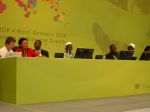
Les acteurs africains sur le podium pendant la manifestation parallèle.
|
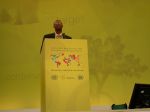
Le Prof Brince Sinsin du Bénin donnant une brève introduction au Projet BIOTA AFRICA.
|
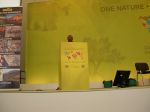
Mr Robert Mukuya, para-écologue de BIOTA venant du Nord de la Namibie.
|
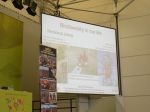
"La Biodiversité est notre vie". A partir de la présentation faite par les acteurs africains.
|
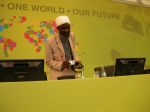
Mr Wilberforce Okeka de l'ONG KEEP basée dans la forêt de Kakamega au Kenya.
|
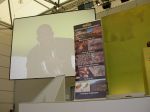
Mr Djafarou Ali Tiomoko, Directeur du Parc National de la Pendjari au Bénin, répondant aux questions de l'auditoire.
|

Photo de groupe des panélistes pendant la manifestation parallèle. De gauche à droite: Gnanando Saidou, Michael Kirk, Djafarou Ali Tiomoko, Robert Mukuya, Marianna Lot, Brice Sinsin, Ute Schmiedel, Wilberforce Okeka et Beatrice Khayota.
|

Une vue de l'auditoire pendant la manifestation parallèle de BIOTA.
|
|
Fotos: BIOTA AFRICA/Tene Kwetche |
|
|






 Go to the WeatherNet
Go to the WeatherNet








